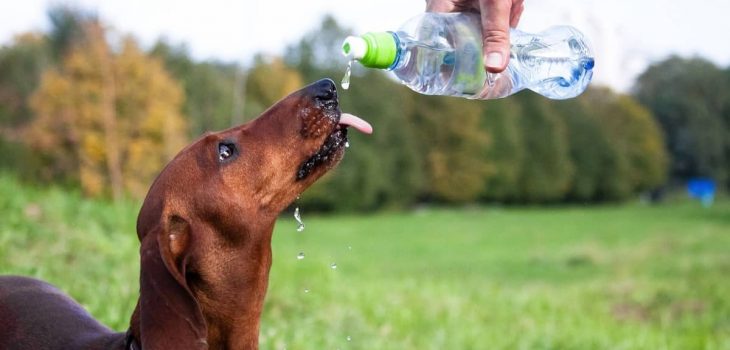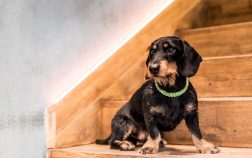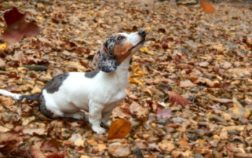Having a quick drink after exercise is meant to be an enjoyable and relaxing experience. Yet, sometimes that’s not the case. So, your dachshund coughs after drinking water – what does it mean? If it’s just occasional coughing then it surely isn’t a big deal, right? But what if it’s something more regular and systemic?
Dachshund Coughs After Drinking Water – Why?
In dogs as in humans, coughing after drinking or eating is usually just a normal reflex of keeping our trachea safe and dry. We’ll get into what exactly the trachea is below but suffice it to say that coughing sometimes is not a problem when you’ve just got something in your windpipe. In those situations, coughing is just the body’s way of getting stuff out of where it isn’t supposed to be.
However, if stuff regularly gets where it isn’t supposed to be, that may indicate a medical problem. There are three main and unfortunate culprits for that – kennel cough, a collapsed trachea, or a hypoplastic trachea. Or, it could just be that your dog likes to drink too fast and gets water droplets down its windpipe.
Read more about Can Dogs Drink Gatorade For Dehydration?.
What is the trachea?
Better known as the windpipe, the trachea is the tube that connects the nose and mouth of the dog with the lungs. It’s pretty much the same as people’s tracheas. However, as with humans, the trachea goes parallel to the esophagus (the food pipe going down the throat). And, as it shares the same entrance – the mouth – the trachea utilizes a small flap called the epiglottis that closes over the trachea when we eat or drink.
Most of the time, the epiglottis does its job perfectly. However, if your dog is gagging after drinking water more often than not, there might be something wrong with the whole system. Here are the four possible problems, starting with the lightest one.
Drinking too fast
This is a surprisingly common problem in a lot of dogs, especially young pups. Of the four main answers to “Why does my dog cough after drinking water?” this is both the most often seen and the most inconsequential one.
All you need to do if your pup is drinking too fast is get a water bowl that prevents the dog from drinking too quickly. If you have a similar problem with the feeding speed, there are also bowls for slowing that down too.
Or, if the pup is still young, you can just wait a couple of months. Once the dog grows into an adult, chances are the behavior will balance itself out.

Kennel cough
Onto the more unfortunate causes of the problem – kennel cough is essentially the canine equivalent of the common cold. If a dachshund coughs after drinking water, it may just have caught a kennel cough or Infectious Canine Tracheobronchitis as is the condition’s scientific name.
This is a highly transmittable disease, hence its name – it can be seen in dog kennels incredibly often. So, your dog could have easily caught it after a trip to the groomer, to the vet, or in the dog park. Coughing after drinking will be especially common if your dog is sick but it won’t be the only time. The worse the kennel cough gets, the more often your dog is going to cough.
Fortunately, kennel cough is not too harsh and usually passes on its own after a week or two. Still, if the coughing worsens to a worrying degree, get in touch with your vet as soon as possible.
Tracheal collapse
Collapsing trachea is a degenerative condition that causes the trachea to lose its integrity and start failing to do its job and properly prevent water and food from getting in it. The condition tends to get worse and worse over time, eventually leading to breathing difficulties if left untreated.
This isn’t a condition that affects young dogs, however. Instead, it usually appears in adult and senior dogs – 4 to 6 years of age or older. The collapsing trachea can be identified by the combination of gagging and a deep honking cough.
Needless to say, the sooner you catch the issue and contact your vet, the better. Collapsing trachea can’t really be reversed but it can be managed. So, your vet should be able to help your dog live out its days pretty comfortably and the condition shouldn’t affect your pet’s lifespan.
Hypoplastic trachea
On the other end of the age spectrum, if a young dachshund coughs after drinking water, you may be faced with a Hypoplastic trachea. Unlike collapsing trachea, this issue is a genetic abnormality meaning that your dog is born with it. That’s why it’s identifiable early on in the pup’s life. Simply put, dogs with this issue have underdeveloped tracheas which is why they can’t drink water without coughing.
Fortunately, the issue is rarely severe enough to necessitate surgical intervention. Most dogs are able to live a full and happy life with the right lifestyle adjustments (avoid obesity, don’t use leash collars, elevate the water and food bowls, and so on). In rare cases, your vet may prescribe certain medications to manage the condition if it’s severe enough. And, in even rarer cases, surgery may be necessary to reinforce your dog’s trachea.
Are These Problems Common In Dachshunds?
The latter two issues – Collapsed trachea and Hypoplastic trachea – are far from common in dachshunds. Instead, Hypoplastic trachea can usually be seen in dogs with Brachycephalic Syndrome (i.e. short-faced breeds such as English bulldogs, Pugs, Boston terriers, etc).
Collapsed trachea, on the other hand, is more common in breeds such as Poodles, Yorkshire terriers, Pomeranians, and Chihuahuas. As for kennel cough – it can affect any dog, however, it’s more common in the more outdoorsy and outgoing breeds simply because they tend to interact with each other more. Indoor dogs like the dachshund simply don’t get in contact with that many other dogs.
As for coughing out of enthusiasm to drink as fast as possible – yes, young Doxies are indeed often guilty of that.

What Should I Do If My Dog Chokes On Water?
If you notice that the problem is reoccurring, you should simply contact your vet. If the coughing is happening only after drinking water, Collapsing trachea and Hypoplastic trachea are two possible explanations. But, if the cough happens even when the dog hasn’t eaten or drunk anything, it may be kennel cough. Either way, your vet should recommend the best course of action.
Read more about Why Does My Dachshund Shake And What Should I Do?.




